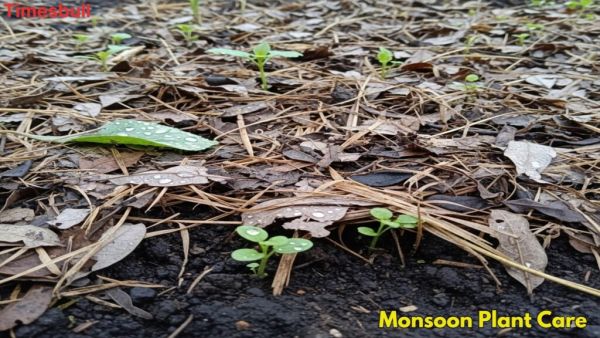
In today’s busy life, even a small garden at home giving peace of mind. But, as much as the rainy season brings greenry, it also also poses some challenges for the plants. Due to excess moisture, fungus and moss can accumulate in the pots, which damages the roots of the plants and can also rot them. In such a situation, it becomes very important to take care of your beloved plants. By adopting regular care and some effective home remedies, you can keep your garden safe and healthy even in this season. Let us know 7 such special ways by which your plants will keep blooming.
1. Home Remedies to Prevent Fungus
Fungus is the biggest enemy of plants, especially in the rain. There are some natural and effective home remedies to deal with it. Gardening Expert Ramesh Kumar Says that bot neem oil and apple cider vinegar are very effective in preventing fungus. Mix any one of these things in 1 liter of water and spray it on the plants. This mixture does not allow the fungus to grow.
Turmeric does magic not only in spices but also in gardening. Turmic solution also keeps ants away, which often harm the plants. This Remedy Protects Plants from Both Fungus and Pests. Sodium bicarbonate (baking soda) is also very helpful in gardening. It helps in removing fungus from the soil and roots.
2. Elimination of Weeds
In the Rainy Season, Weeds Spread Rapidly and Absorb The Nutrients of the Plants, which stops their growth. According to Horticulture Expert Ramesh Kumar, Weeds Should Be Destroyed Before The Plants Flower. Use a hoe or sickle to remove weeds from the root. Keep weeding from time to time so that they do not grow again.
3. The Magic of Mulching
Mulching is an effective way to prevent weeds and maintain soil moisture. For this, Spread a layer of dry leaves, cardboard, or newspaper on the soil. This layer prevents weeds from growing. Mulching also provides moisture to the soil and acts as organic fertilizer, which provides nutrition to the plants. It is much better and safer than chemical measures.
4. Companion Gardening
Planting the right plants together is called company gardening, which has many benefits. Gardening Experts Advise that Planting Plants in the Right harmony is beneficial. For example, it is better to plant marigolds, celery, or carrots with tomatoes, while not planting corn or cabbage with them. This helps to control pests, maintain nutritional balance, and improve the soil, which also improves the improves plant production.
5. Choosing the right seeds
The Selection of Good and Clean seeds is very important for healthy and strong plants. Always select good-Quality seeds before Sowing. If possible, use seeds taken from your healthy plants. This ensures that the seeds are pure and disease-free.

6. Correct use of manure
Soil quality is important for plant growth. Use Rotten Cow Dung Manure and Home-Made Compost. It reduces the chances of weeds and makes the soil fertile. Organic manure is far better than chemical fertilizers, as it improves the Soil Structure and Provides Natural Nutrition to the plants.
7. Removing Moss and Weeding the Soil
Due to a lacked of adequate Sunlight or Poor Drainage, Moss Starts Accumulating in the Soil of the Pot. To avoid this, scrape off the accumulated moss and weed the soil. After this, let the soil dry for 2-3 days. Then Add Ash, Coal, or Cow Dung Cakes to the Soil. This will remove the Moss and Provide Proper Nutrition to the plants, as well as increase air circulation in the soil.
-
There are 3 such Shiva temples in India where free eating and living facilities; Visit once this year’s Shravan

-
Start consuming these natural things new mothers, help in becoming breast milk

-
Amazon Great Freedom Festival Sale: Up to 58% of the discount to 58% on smart TV, this is a golden opportunity to buy!

-
1,000 Follower Minimum Now Required:

-
These are the secret features of Google Play Store, will help in protecting against loss
